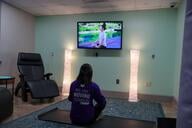You have /5 articles left.
Sign up for a free account or log in.

iStock
More than 6,300 cases of COVID-19 can be linked to students and employees at about 270 public and private colleges and universities from which The New York Times solicited and received data, the newspaper reported Wednesday. The Times identified 14 deaths from those infected. In other updates, another set of colleges and universities announced varying degrees of further limitations on previously planned campus reopenings, a new survey of private college staff members shows them to be worried about their colleges' futures, and COVID-19-related revenue declines in Iowa result in cutbacks for the state's public colleges.
The New York Times surveyed all American public four-year colleges plus private institutions that compete in Division I sports or belong to the Association of American Universities, an exclusive group of research universities. The survey includes data for 270 institutions, but the Times notes that some of the nearly 1,000 institutions it contacted declined to provide data or did not respond.
The newspaper's report states that the tally is "almost certainly an undercount" and that many institutions that provided numerical data "offered no details about who contracted the virus, when they became ill or whether a case was connected to a larger outbreak."
Several major public universities, like the University of Texas at Austin, the University of Central Florida and the University of Georgia, top the list at over or near 400 cases. All of those institutions regularly update the number of cases on their websites.
The Times did not provide a list of institutions that declined to respond to its request for data, but the article was updated later Wednesday to add this information:
"A spokesman at Arizona State [University] … said they 'chose months ago to not release data/names/results' on coronavirus cases. A spokesman for Montana State University said the school 'does not provide health information on its students, faculty or staff, even on general subgroups.' The United States Naval Academy cited 'operational security' concerns. A spokeswoman for Washburn University in Kansas said she believed giving such information would violate privacy laws. And while the University of Missouri’s athletic department confirmed 10 cases, a spokesman at the flagship campus would not provide information about other students and employees."
Colleges and universities continue to announce (or in some cases, revise) their plans for the fall semester. The announcements collectively represent fascinating gradations along a continuum, though in virtually all cases they show a further limiting of physical reopenings of their campuses. Among the latest changes:
- Georgetown University, citing new COVID-related emergency declarations and limitations on travel into the District of Columbia, said it would abandon plans to bring freshmen back to campus this fall and would start the fall with all classes delivered virtually. Georgetown said the only students allowed to return to campus would be those who don't have secure housing or safe learning environments. Georgetown joined George Washington University, another D.C. institution, which said Monday that it would hold the entire fall semester online.
- Colgate University announced Wednesday that it would require all students to quarantine for 14 days when they arrive at the rural New York private institution for the fall semester. Officials at Colgate, who said they still planned to bring all students back to campus because the university is an "academic community that learns best when we are together," said the move was necessitated by "the best science to date" as well as New York State law that requires quarantine for those entering New York from many states. That requirement affects well over half of Colgate's students, the announcement said. Tufts University, in Massachusetts, made a roughly similar announcement Wednesday, saying it would spread students' arrival to the campus out over a month and require quarantine for all students.
College and university staff members rate their campus's leaders highly on how they've handled COVID-19 and treated their workers, and they give the institutions generally high grades on how they've communicated about the crisis. But fewer say the colleges have communicated effectively about their jobs and the institutions' future viability, and nearly two-thirds say they worry about "what the future holds" for their employer.
Those are among the findings of the HEDS COVID-19 Institutional Response Staff Survey, one of a series of studies conducted by the Higher Education Data Sharing Consortium, a consortium of two- and four-year colleges.
The survey is one of a few that take the pulse of college staff members, who do the heavy lifting at many institutions but generally get far less attention than faculty members and students.
Not surprisingly, the roughly 6,000 staff members from 29 colleges said they were most worried about the health and well-being of their friends and family members, but a close second was concern about their institution's future. Some colleges were facing enrollment challenges before COVID-19 hit, and the prospect of a closed campus or diminished residential experience for the fall could challenge many of them further. Significantly fewer expressed worry about losing their job.
On balance, women and members of minority groups expressed higher levels of worry about most of the subjects above than did their white peers.
At least three-quarters of employees credited their institution with the timeliness and clarity of its communications about responding to COVID-19. But less than two-thirds said the same about the information they've received about how their employment or institution's "future viability" might be affected.
The survey's authors, Charles Blaich and Kathy Wise, noted that some institutional leaders "didn’t want to ask detailed questions on what faculty and staff are worrying about or students’ intentions to return to their institution. They worried that simply asking a question on a survey would create fear and panic among staff, faculty, and students." While acknowledging that "fear and panic are bad things," the authors wrote, "not asking hard questions or talking about challenging news may promote even more fear and panic."
As one employee put it in an open-ended comment: “COMMUNICATE MORE. Be honest. You may be concerned about saying too much and scaring people with different scenarios, but WE ARE MORE SCARED KNOWING NOTHING.”
Just about every state has suffered drops in tax or other revenues related to COVID-19, and many public colleges and universities will face budget cutbacks as a result in the next 12 or more months. Iowa's three public universities are among the first.
The Iowa Board of Regents, which oversees Iowa State University and the Universities of Iowa and Northern Iowa, approved a budget Tuesday that sliced $65.4 million from the three institutions' fiscal 2020-21 budgets, the Des Moines Register reported.
The regents cited $8 million in legislative budget cuts as well as an expected shortfall of more than $50 million in tuition revenues, due to a combination of enrollment declines and a tuition freeze imposed by the regents, the Register reported.





